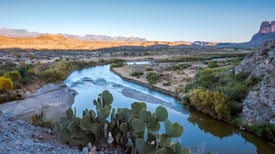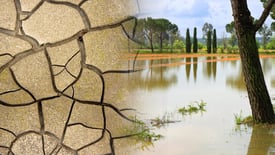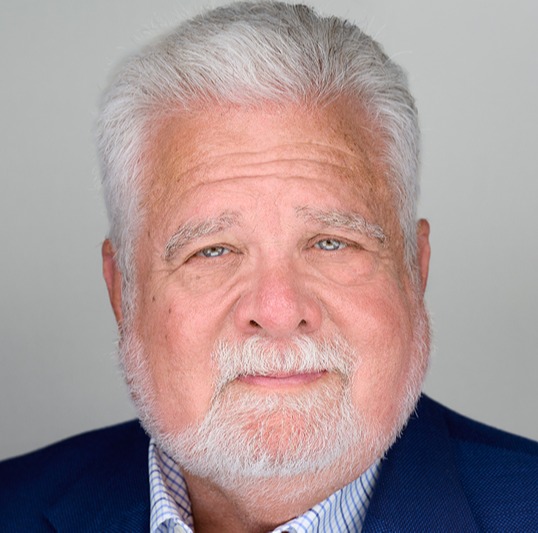Water is the key to the future for Texas
BUT MANAGING WATER RESOURCES SUSTAINABLY IS A CHALLENGE AS BIG AS TEXASIt's the Water. It Always is.
Water drives the economic engine. Just ask the businesses around Phoenix. In some areas, the state has issued a notice that nothing can be built until future water sources are identified and developed. As in, economic development stopped. Altogether. That is not a threat. It’s not hyperbole. It’s a fact.
But Texas? We’ve done some homework. We’ve made plans that include projections of future water needs water sources and even estimates of the cost to develop them. We have conservation plans, too. The everyday “please conserve” variety and the “OMG, this drought” variety. Yes, both our conservation drought contingency plans can be more aggressive resulting in closing in part the gap between demand and need. Where conservation and reuse does not close the gap, water supply augmentation needs to take place.
In the last few years Texans have learned how closely linked power and water and economic vitality are. Our grid and our water need substantial investment and this year the Texas Legislature allocated budget surplus to them. They allocated $1 billion for water supply development and for reduction in loss of water from existing sources due to line loss. That is a lot of money and it’s an initial investment. But there’s more. Additional funding was budgeted for matching available federal funding contributions to the Drinking Water State Revolving Fund and Clean Water State Revolving Funds.
The state retained its other funding sources via the State Water Implementation Funds for Texas (SWIFT) and the Economically Distressed Areas Program (EDAP).
Separate funding is allocated for flood mitigation.
In November, voters will be asked to support that $1 billion allocation for water. But, in Texas, voters have always been a resounding yes on water investments. It’s a huge investment, but the need is even greater and sustainable.
Now you have to ask, how do I get ready to apply for that funding now?
Robert Sheets on Water Planning
Advancing Water Supply Development and Funding
Robert Sheets, Executive Vice President, Anser Advisory speaks to the House Natural Resources Committee about flexibility for public utilities, financing and operational integrity.
Anser Advisory Knows Water. Anser Advisory Knows Texas.
Anser Advisory has helped local governments and utilities acquire funding and is currently managing water and wastewater projects in excess of $2 billion.
There is still a lot of funding available for water. Getting access to it is not as simple as submitting a grant application and being lucky enough to be selected for funding. Each funding mechanism has different allocations and cost-share requirements for different projects. So, even though your project is great and maybe even be shovel-ready, you must apply at the appropriate time and for the appropriate funding options where your chances of success are best. While today available funding is significant, it will be allocated quickly and opportunity to seek additional funds later on may not be as abundant. Let’s get organized!
How do We do it?
- We identify and help develop fundable projects.
- We identify the most likely funding source(s).
- We establish rule-compliant processes and systems.
- We ensure that projects are audit ready.
- We manage the projects to make sure every dollar is spent correctly. We are currently managing more than $2 billion in projects.

Here's How We Can Help.
- Asset assessment, including current and future needs to develop a Capital Improvement Plan
- Compliance assessment, including financial and environmental.
- Maximizing leveraged funding opportunities (state, local and specialty grants and low-interest loans.)
- Grant and funding application process
- Project Management
- Grants Management
Competing for Funding
Anser Advisory has experience helping small, rural, and challenged communities of all sizes develop cooperative relationships, making applications more competitive for grants and loans. This alternative governance structure lets the local government maintain control of facilities, investment, and rate impacts as part of a multi-jurisdictional cooperative.
When voters approve $1 billion in November, we think the parameters to access funding will prioritize regional collaborative projects and communities of 150,000 or less. It makes sense. Cooperators will leverage their (likely) lower-cost investment with state and maybe federal dollars. Rural Texas will benefit.
It is one thing to have funding available, it is another to access it. Shovel-ready projects may be at the front of the line, but small, rural, and Indigenous communities have specific funding allocations. These communities have more success when they form partnerships and work together to develop water projects and infrastructure.
Governance Matters
In the old days, a utility would project its needs, identify sources, seek permits, float bonds and let the ratepayers underwrite the need. While that model still exists, its success is dwindling both because the cost of developing acceptable new supplies, when they can be found, are costly. Then there is this: increasingly federal, state, regional, and agencies funding sources are prioritizing regional, collaborative projects.
The Texas Legislature and state statutes make it easier than ever for utilities to develop Public Utility Agencies without having to divest control of their facilities.
This ensures great planning and awesome implementation. Better still, this approach puts a partnership of smaller, rural communities on a competitive footing with larger facilities.
At Anser we’ve got decades of experience helping smaller, challenged utilities to access the technical and financial resources they need to give customers the quality of water and service they deserve. We’ve done this repeatedly without giving customers rate shock.
We want our water to be safe, sustainable, environmentally friendly, drought proof and affordable. It’s a big task, then again, we’re Texas.
Water Infrastructure
We need to invest in both hard and soft utility systems. That is pipes and pumps and new supplies but also in software and people and more. We’ve identified possible new sources in the State Water Plan even while some regions have already exceeded available sources or will soon. Water supply development is a long-term program. Investments must be planned and built into water rates so that customers are not subject to “rate shock,” a sudden, dramatic increase in the cost of water. Our new supplies need to be environmentally sensitive, too. Our quality of life depends on it.
The American Rescue Plan Act (ARPA) and the Infrastructure and Investment and Jobs Act (IIJA) provide funding for water infrastructure including facilities and technology upgrades to water supply development and much more. The ARPA funds were distributed directly to local and state coffers. The IIJA, and other state water funds on the other hand, are competitive.
These investments will give communities that have failed to invest an opportunity to reset their water systems to current standards. For utilities that have invested in maintenance and expansion, the money is an incentive to take the next steps. And, finally, the money is a boost to those (like us in Texas) trying to identify, acquire and build water supplies for the future.
The federal government prefers cooperation over litigation when it comes to water funding. The Texas Legislature also has a strong preference for cooperative regional solutions. As a practical matter, it is better, cheaper, and faster to cooperate. As a bonus, the available dollars are spent on water rather than administrative processes.
Insights & Resources
Can we make less water serve more people and businesses? We’ve identified potential sources and places where demand has exceeded supply or will soon. We have growth, reduced resources and drought. How do we manage through that? First we need to understand the issues. The materials in this section describe the challenges.
Ask Carlos Rubinstein: Q&A with a Texas Water Expert Series
Texas water expert Carlos Rubinstein provides information about several common and important questions regarding water in Texas and the Texas State Water Plan.
Learn More →
Where's Carlos? Video Challenges
Can you guess where Carlos is in each video? In each installment of this short video series, Texas water policy expert Carlos Rubinstein describes an area in Texas based solely on the water challenges that area faces.
Test your knowledge →
3-Part Podcast: Water Experts Talk Texas Water
During this podcast, we will discuss some of the gaps in Texas water Infrastructure, the support available to communities, and how Anser Advisory can help communities take the steps to receive the federal funding needed.
Watch the Series →
Texas Water Brochure
Check out this brochure to learn more about Anser Advisory's water and wastewater expertise and capabilities, as well as how we can help your community in Texas maximize the investment impact of your water infrastructure projects.
Get the brochure →

GUA Overview Guide
Check out our free guide to learn about Government Utility Authorities (GUA), how they work well for communities around the country, and how they can work for your community in Texas.
Get the guide →
.jpeg)
Blog: Aging Infrastructure
Most small utilities lack funding and technical expertise to meet the defined need and structure funding in compliance with federal and state requirements.
Read More →

Blog: Challenges and Opportunities for the Future of Water in Texas
Failure to properly manage our water resources and infrastructure, failure to develop new water supplies, and failure to improve our water quality will mean that Texans will not have sufficient water.
Read More →

Blog: Providing Technical Assistance to Utilities of Any Size
Utility Directors are, as a rule, an independent group. Their main focus is on delivering quality water to their customers at an affordable cost.
Read More →

Blog: Show Me the Money
Most small utilities lack funding and technical expertise to meet the defined need and structure funding in compliance with federal and state requirements.
Read More →

Blog: Collaboration Helps Communities Win Water Infrastructure Funds
There are steps that smaller and rural utilities can take to get the funding needed to serve their customers.
Read More →

Blog: Providing Technical Assistance to Utilities of Any Size
Utility Directors are, as a rule, an independent group. Their main focus is on delivering quality water to their customers at an affordable cost.
Read More →

Blog: Drought and Flooding
Often, there’s more rain than we or nature can absorb, resulting in flooding. On the opposite side of that concern is experiencing drought.
Read More →

Blog: What Texas Needs to Know About Government Utility Authorities & Water
In search of a more direct, simplified means of water management, Texas GUA explores the framework of Florida's water authorities with the future in mind.
Read More →
Where Does Your Water Come From?
With drought on the rise and water supplies shrinking, it is imperative that we act now!
Watch Video →
HOW WE CAN HELP
We provide technical assistance, project management, and innovative delivery solutions to Texas public sector water clients.
We help our clients:
- Compete for and utilize IIJA dollars, as well as other state and federal programs
- Effectively execute projects and programs while maximizing investment impact
With our support, utility providers, end-customers, and communities manage scarce water resources sustainably.
Want to learn even more?
Submit the form and a member of the team will follow up with you.
We are service delivery experts,
here to help you achieve maximum success.
As your project representative and service delivery experts, we provide technical assistance, project management support, and innovative solutions to maximize the utilization of IIJA dollars and other state and federal programs, in the face of stiff competition for those resources, to help you effectively execute these projects while maximizing investment impact.
Through our efforts, we can help with cost and scope containment to benefit both the utility providers and the end-customers and communities.
Our Leadership Team

Robert Sheets
Leader, Government Services Group, Anser Advisory
Known as a man who gets things done, Robert Sheets has spent a professional lifetime helping advance the goals of local governments. His relationships with local, regional, and state governments, as well as the Department of Defense have been instrumental in establishing public-private partnerships with a triple bottom line: good for the community, good for business, and good for the environment.

Carlos Rubinstein
Water Policy Consultant, Anser Advisory
Rubinstein is an expert on Texas water policy. As chairperson of the Texas Water Development Board (2013-2015) he oversaw the implementation of the $2 billion State Water Infrastructure Fund. (SWIFT). He is a Board Member of the Texas Water Foundation and the Texas Water Trade. Rubinstein has served as the Texas representative to the Western States Water Council, and the Border Governors' Conference Sustainable Development worktable. Rubinstein served as a commissioner of the Texas Commission on Environmental Quality (TCEQ) from 2009–2013. He is a former deputy executive director of TCEQ and Rio Grande Watermaster. Rubinstein has appeared as an expert witness on various environmental cases and has published several peer-reviewed articles on Texas water policy. He is a former city manager for the City of Brownsville. Rubinstein earned a bachelor's degree in biology from Pan American University.

Ian Alderson
Vice President, Anser Advisory
Alderson brings more than three decades of experience in infrastructure planning, procurement, delivery, and asset management serving clients in Africa, Asia, the Caribbean, North America, and the Pacific. His work has included advising public and private sector entities on the development and implementation of innovative projects using delivery methods including design-build, design-build-operate-maintain, and long-term concession agreements, with emphasis on risk management and lifecycle performance optimization. He has been resident in Texas since 2013 and spent nearly a decade supporting the Texas Department of Transportation’s multi-billion-dollar alternative delivery program, including projects in Austin, Dallas, El Paso, Fort Worth, Houston, and San Antonio. Licensed in Texas as a Professional Engineer, Alderson earned his Master of Business Administration from the University of Liverpool, and his Bachelor of Engineering, Civil Engineering from the University of Bolton, both in the UK. Ian is based in Austin.

Kristen Braden
SVP, North Central, Anser Advisory
With a unique background as a professional engineer and an attorney, Kristen brings more than 20 years of experience managing projects in both the public and private markets. She is focused on growing Anser Advisory’s water/wastewater portfolio by providing excellent customer service and assembling and developing the top talent in our industry.





